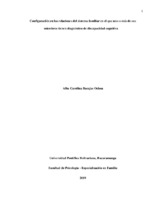| dc.contributor.advisor | Flórez Orduz, Luz Yamile | |
| dc.contributor.author | Barajas Ochoa, Alba Carolina | |
| dc.coverage.temporal | 2019 | |
| dc.date.accessioned | 2021-03-17T20:45:16Z | |
| dc.date.available | 2021-03-17T20:45:16Z | |
| dc.date.issued | 2019-09 | |
| dc.identifier.uri | http://hdl.handle.net/20.500.11912/8202 | |
| dc.description | 45 páginas | spa |
| dc.description.abstract | En la presente revisión bibliográfica se planteó como objetivo identificar las dinámicas relacionales del sistema familiar en el que uno o más de sus miembros cuentan con diagnóstico de discapacidad cognitiva desde su nacimiento o en su desarrollo. Con el fin de lograr lo planteado; se realizó un análisis de fuentes bibliográficas extraídas de bases de datos digitales, libros y revistas indexadas; en las cuales se encontró, que para cualquier sistema familiar el nacimiento de un miembro o la evolución del diagnóstico, se presenta como una crisis no normativa que supone modificaciones en la estructura y dinámica relacional, independientemente de los recursos con los que cuenta la familia para afrontar este tipo de crisis. Y algunos de los recursos de afrontamiento que se encuentran son el apoyo emocional, el conocimiento del diagnóstico y el acompañamiento de las instituciones que rodea a la familia. Por consiguiente, en el presente documento se abordarán las diferentes dinámicas relacionales, las características y cambios en los subsistemas familiares, así como los recursos de afrontamiento desde el proceso autorreferencial de la autora. | spa |
| dc.description.abstract | In the present bibliographic review, the objective was to identify the relational dynamics of the family system in which one or more of its members have a diagnosis of cognitive disability from birth or through its development. In order to achieve the stated; an analysis of bibliographic sources extracted from digital databases, books and indexed journals was carried out; in which it was found that for any family system the birth of a member or the evolution of the diagnosis, is presented as a non-normative crisis that involves changes in the structure and relational dynamics, regardless of the resources available to the family for deal this type of crisis. And some of the coping resources that are found are the emotional support, the knowledge of the diagnosis and the accompaniment of the institutions that surround the family. Therefore, in this document the different relational dynamics, the characteristics and changes in the family subsystems will be addressed, as well as the coping resources from the self-referential process of the author. | eng |
| dc.format.mimetype | application/pdf | |
| dc.language.iso | spa | |
| dc.publisher | Universidad Pontificia Bolivariana | spa |
| dc.rights | Attribution-NonCommercial-NoDerivatives 4.0 International | * |
| dc.rights.uri | http://creativecommons.org/licenses/by-nc-nd/4.0/ | * |
| dc.subject | Diagnóstico | spa |
| dc.subject | Personas con discapacidades mentales | spa |
| dc.subject | Familia | spa |
| dc.subject | Crisis | spa |
| dc.title | Configuración en las relaciones del sistema familiar en el que uno o más de sus miembros tienen diagnóstico de discapacidad cognitiva | spa |
| dc.type | Especialización | spa |
| dc.publisher.department | Escuela de Ciencias Sociales | spa |
| dc.publisher.program | Especialización en Familia | spa |
| dc.type.hasVersion | publishedVersion | spa |
| dc.description.sectional | Bucaramanga | spa |
| dc.description.degreename | Especialista en Familia | spa |


